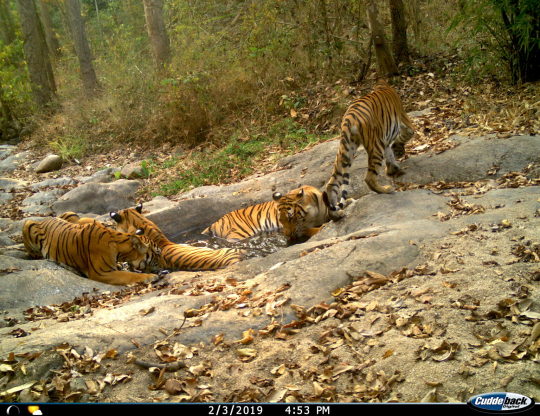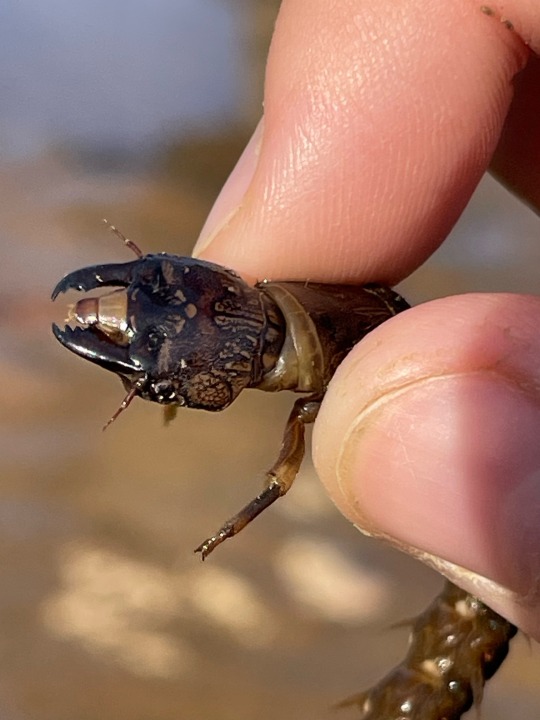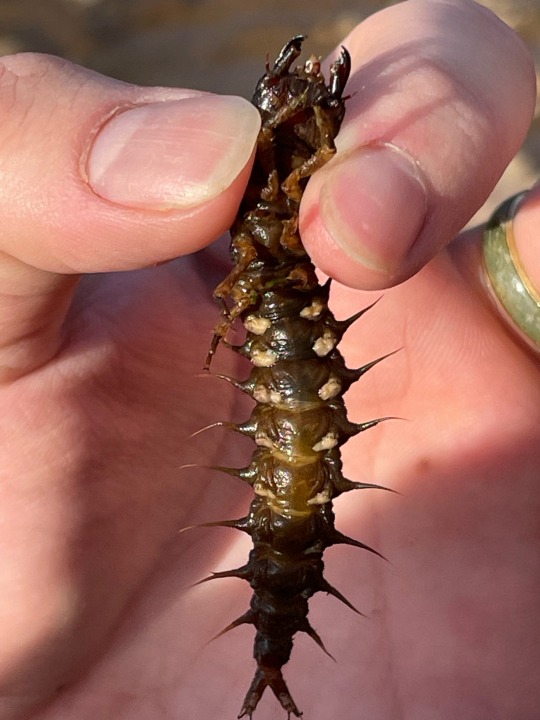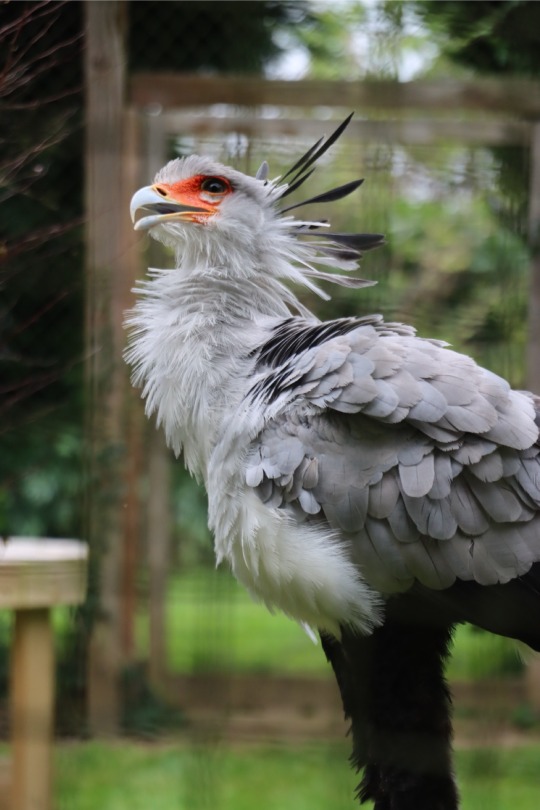#conservation photography
Explore tagged Tumblr posts
Text




Eastern Newt - Notophthalmus viridescens While hiking on a trail somewhat near St. Louis, we found a tiny pond under some pylons that had a variety of species living within it! One of which we saw multiple of were these tiny, very young Eastern Newts! When handling any amphibians, be sure your skin has no open wounds, and I think it's good practice to wet your hand with the water they've been in before handling. That is to say, it's usually best to leave them alone and observe at a distance. We're uncertain why at this point, but this newt and at least one other species nearby (spotted salamander) had these strange lumps/bubbles on some parts of their body. I don't believe it to be natural, so I'm hoping it's not some localized infection in the area. All that aside, seeing newts swim up to us was a highlight of the trip! They're the cutest little things, and they're so curious!
#animal photography#photography#conservation#conservation photography#eastern newt#newt#amphibian#spring#education
32 notes
·
View notes
Text
Snow Leopard cub

📷: nikon d3300
#conservation photographer#nature photographer#photographer#photography#wildlife photographer#wildlife#wildlife photography#lensblr#photographers on tumblr#conservation photography#nature photography#snow leopard#snow leopards#leopard#leopards#big cat#big cats#kitten#kittens#cat#cats#mammal#mammology
32 notes
·
View notes
Text

My absolute favorite wildlife photo ive ever taken. I unfortunately did not have my camera with me as this was a last minute zoo trip on a rainy day, but you can still get amazing photos with your camera phone if you know what you’re doing!
#female photographers#nikonphotography#savvysshots#colorado#giraffe#giraffephoto#conservation photography#cmz#cheyenne mountain zoo#wildlife#wild animals#wildlife photography#wildlife pictures
8 notes
·
View notes
Text
i am interested in doing conservation photography as a career i think but i have bad imposter syndrome about it like i’m not a professional by any means i just mess around with cameras idk if i’m good enough for that
5 notes
·
View notes
Text
Camera-trapping data revealed in a new study show a steady recovery of tigers in Thailand’s Western Forest Complex over the past two decades.
The tiger recovery has been mirrored by a simultaneous increase in the numbers of the tigers’ prey animals, such as sambar deer and types of wild cattle.
The authors attribute the recovery of the tigers and their prey to long-term efforts to strengthen systematic ranger patrols to control poaching as well as efforts to restore key habitats and water sources.
Experts say the lessons learnt can be applied to support tiger recovery in other parts of Thailand and underscore the importance of the core WEFCOM population as a vital source of tigers repopulating adjacent landscapes.
The tiger population density in a series of protected areas in western Thailand has more than doubled over the past two decades, according to new survey data.
Thailand is the final stronghold of the Indochinese tiger (Panthera tigris corbetti), the subspecies having been extirpated from neighboring Cambodia, Laos and Vietnam over the past decade due to poaching, habitat loss and indiscriminate snaring...
Fewer than 200 tigers are thought to remain in Thailand’s national parks and wildlife sanctuaries, only a handful of which are sufficiently undisturbed and well-protected to preserve breeding tigers.
The most important of these protected areas for tigers is the Huai Kha Khaeng Thung Yai (HKK-TY) UNESCO World Heritage Site, which comprises three distinct reserves out of the 17 that make up Thailand’s Western Forest Complex (WEFCOM). Together, these three reserves — Huai Kha Khaeng Wildlife Sanctuary, Thungyai Naresuan West and Thungyai Naresuan East — account for more than a third of the entire WEFCOM landscape.
Now, a new study published in Global Ecology and Conservation documents a steady recovery of tigers within the HKK-TY reserves since camera trap surveys began in 2007. The most recent year of surveys, which concluded in November 2023, photographed 94 individual tigers, up from 75 individuals in the previous year, and from fewer than 40 in 2007.
Healthy tiger families

The study findings reveal that the tiger population grew on average 4% per year in Hua Kha Khaeng Wildlife Sanctuary, the largest and longest-protected of the reserves, corresponding to an increase in tiger density from 1.3 tigers per 100 square kilometers, to 2.9 tigers/100 km2.
“Tiger recoveries in Southeast Asia are few, and examples such as these highlight that recoveries can be supported outside of South Asia, where most of the good news [about tigers] appears to come from,” said Abishek Harihar, tiger program director for Panthera, the global wildcat conservation organization, who was not involved in the study.
Among the camera trap footage gathered in HKK-TY over the years were encouraging scenes of healthy tiger families, including one instance of a mother tiger and her three grownup cubs lapping water and lounging in a jacuzzi-sized watering hole. The tiger family stayed by the water source for five days during the height of the dry season.
The team of researchers from Thailand’s Department of National Parks, Wildlife and Plant Conservation, the Wildlife Conservation Society, Kasetsart University, and India’s Center for Wildlife Studies deployed camera traps at more than 270 separate locations throughout the HKK-TY reserves, amassing 98,305 days’ worth of camera-trap data over the 19-year study period.
Using software that identifies individual tigers by their unique stripe patterns, they built a reference database of all known tigers frequenting the three reserves. A total of 291 individual tigers older than 1 year were recorded, as well as 67 cubs younger than 1 year [over the course of the study].
Ten of the tigers were photographed in more than one of the reserves, indicating their territories straddled the reserve boundaries. The authors conclude that each of the three reserves has a solid breeding tiger population and that, taken together, the HKK-TY landscape is a vital source of tigers that could potentially repopulate surrounding areas where they’ve been lost. This is supported by cases of known HKK-TY tigers dispersing into neighboring parts of WEFCOM and even across the border into Myanmar.
Conservation efforts pay off
Anak Pattanavibool, study co-author and Thailand country director at the Wildlife Conservation Society, told Mongabay that population models that take into account the full extent of suitable habitat available to tigers within the reserves and the likelihood that some tigers inevitably go undetected by camera surveys indicate there could be up to 140 tigers within the HKK-YT landscape.
Anak told Mongabay the tiger recovery is a clear indication that conservation efforts are starting to pay off. In particular, long-term action to strengthen systematic ranger patrols to control poaching as well as efforts to boost the tigers’ prey populations seem to be working, he said.
“Conservation success takes time. At the beginning we didn’t have much confidence that it would be possible [to recover tiger numbers], but we’ve been patient,” Anak said. For him, the turning point came in 2012, when authorities arrested and — with the aid of tiger stripe recognition software — prosecuted several tiger-poaching gangs operating in Huai Kha Khaeng. “These cases sent a strong message to poaching gangs and they stopped coming to these forests,” he said."
...ranger teams have detected no tiger poaching in the HKK-TY part of WEFCOM since 2013.
-via Mongabay News, July 17, 2024
#tigers#thailand#thai#endangered species#big cats#conservation#wildlife#wildlife conservation#wildlife photography#poaching#good news#hope
2K notes
·
View notes
Text


Churchill, Manitoba
stephenwilkes
3K notes
·
View notes
Text

Florida's only endemic bird species is the threatened Florida scrub jay, who has lost most of its habitat to development. Learn how you can help make a difference in the article below. Floridians, let's save room for this magnificent species.
#nature#wildlife#animals#wildlifephotography#animallovers#naturephotography#conservation#conservation photography#endangered#endangered species#florida#scrub jay
1 note
·
View note
Text
#NorthernRaven
Early morning visit from a friend… maybe too early. Mountainous Parts of the Northern Hemisphere.
@BenAdrienProulx December 12, 2024.
#Northern Raven#Ravens#Wildlife Need Protection#Wilderness Need Protection#IUCN#International Union for Conservation of Nature#ECCC#Environment and Climate Change Canada#FeederWatch#Count Feeder Birds for Science#NCC#Nature Conservancy of Canada#Silent Hill#Raw Nature#Nature Photography#Nature Canada#Wild Bird Photography#Wildlife Photography#Bird#Bird Photography#Animal Photography#Animal Video#The Heart of the Healer#Mountainous Parts of the Northern Hemisphere#Canada#Mohawk Native Reserve#The RavenKeeper
438 notes
·
View notes
Text


" Fluffy Winter Coat🐺" // © Sondre Eriksen Hensema
#Langedrag Naturpark#Tunhovd#Norway#nature#landscape#Portrait#Wildlife#Wolf#Wolves#Wolfdog#Wolfhound#Forest#Trees#Reserve#Conservation#photography#aesthetics#wanderlust#explore#follow#discover
429 notes
·
View notes
Text

Branch No.3, 2022. Leila Jeffreys. Photograph on archival fibre based cotton rag paper.
#photography#fotografia#fotografie#photographie#color#birds#nature#painterly#contemporary#foto#animals#wildlife#conservation
459 notes
·
View notes
Text




Western Slimy Salamander - Plethodon albagula These little guys let out a sticky secretion almost like glue, and we've definitely felt it on our hands the couple times we held them! They have beautiful white spots along their body, and are sometimes very quick! This one in particular had regrown his tail at least once, visible by the different coloration in the majority of it and a smaller different colored tail tip!
#photography#amphibian#salamander#conservation#conservation photography#education#wildlife#spring#cute
10 notes
·
View notes
Text
Zebra Swallowtails

📷: nikon d3300
📍: indian cave state park, nebraska
#zebra swallowtails#zebra swallowtail#butterfly#butterflies#lepidoptera#lepidopterology#entomology#insect#insects#bug#bugs#insect photography#wildlife photography#conservation photographer#nature photographer#photographer#photography#wildlife photographer#nature photography#insect photographer#lensblr#photographers on tumblr#conservation photography
22 notes
·
View notes
Text



hellgrammite!!! (eastern dobsonfly nymph)
I love these so much, their patterns are so beautiful. They can bite pretty hard, but i’ve never had one bite me at all. otherwise they’re harmless!
you can see its abdominal gills as well, which are really fucking cool !!
#hellgrammite#fishing#fishblr#conservation#nature#biology#insects#bugs#entomology#macroinvertebrates#bugcore#wildlife#wildlife photography#bug photography
688 notes
·
View notes
Text
American Bison On The Prairies of Oklahoma
Source Me laf@ilyF ❤️
#original photographers#colors#artists on tumblr#oklahoma#my photos#my escape#my photgraphy#nature#photographers on tumblr#American Bison#buffalo#wildlife conservation#Wichita Mountains Wildlife Refuge#calves#newcomers#Scuba Steve#wildlife photography
536 notes
·
View notes
Text


Visited the Hawk Conservancy for my fiancé’s birthday and snapped these of Angola 🧡
2K notes
·
View notes
Text
"In short:
Victorian farmers and volunteers have planted 750,000 trees to restore habitat for a critically endangered bird.
The Regent Honeyeater Project has brought together volunteers from all walks of life since it was launched in the 1990s.
What's next?
An ornithologist says the project is working wonders for the species and other wildlife.
--
John Paul Murphy is not an ecologist, but he knows a thing or two about trees.
The young cattle farmer from Winton in north-east Victoria has helped plant more than 750,000 trees as part of the Regent Honeyeater Project.
"Our involvement as a family goes back to the early 1990s, when the project first kicked off," Mr Murphy said.
The regent honeyeater is a critically endangered bird known for its black-and-bright-yellow colouring.

"Back in the day, millions of these birds would darken the sky from Adelaide up to Queensland," ornithologist Maggie Watson said.
"They're quite large compared to other honeyeaters, are highly nectar-dependent, and are one of the main pollinators of eucalypt trees."
Dr Watson, based in Burrumbuttock, New South Wales, said habitat fragmentation was a major reason the bird was threatened.
"When people started clearing farmland as part of colonisation in the 1800s, they removed all the productive, nectar-producing trees," she said.
"So that essentially wiped out the regent honeyeater's main food-base."
'Great for all wildlife'
Benalla cattle farmer and Regent Honeyeater Project president Rob Richardson said agriculture had claimed its share of the environment.
"We've destroyed a lot of habitat to create grazing and cropping land to the point where there are less than 500 wild regent honeyeaters left in Australia," he said.
"So now we're trying to restore the balance.
"We propagate all the trees in our plant nursery, and then plant them across the landscape to establish vegetation corridors."
Dr Watson said the project would significantly benefit the regent honeyeater population.
"The birds need to have 'roads' to get to flowering trees like eucalypts, and those roads happen to be other trees — so the more you plant, the better," she said.
"Tackling habitat fragmentation is great for all wildlife."
Huge volunteer effort
Mr Richardson said local volunteers were at the heart of the project.
"Over the last 30 years we've had many farmers donate land to be revegetated and over 40,000 volunteers help plant all the trees," he said.
Mr Murphy said the volunteers came from all walks of life.
"At our planting days, I've met university students, doctors, lawyers, biologists … and many of them come back year after year," he said.
Mr Murphy said it was nice to have a chance to get to know with people he may not otherwise have met.
"Farming can be pretty isolating," he said.
"But when you're planting, learning, and just getting your hands dirty together, the conversations you have are really unique.""
-via ABC News Australia, December 2, 2024
#birds#ornithology#australia#honeyeater#bird photography#wild birds#birdblr#endangered species#ecosystem restoration#habitat#conservation#good news#hope
633 notes
·
View notes